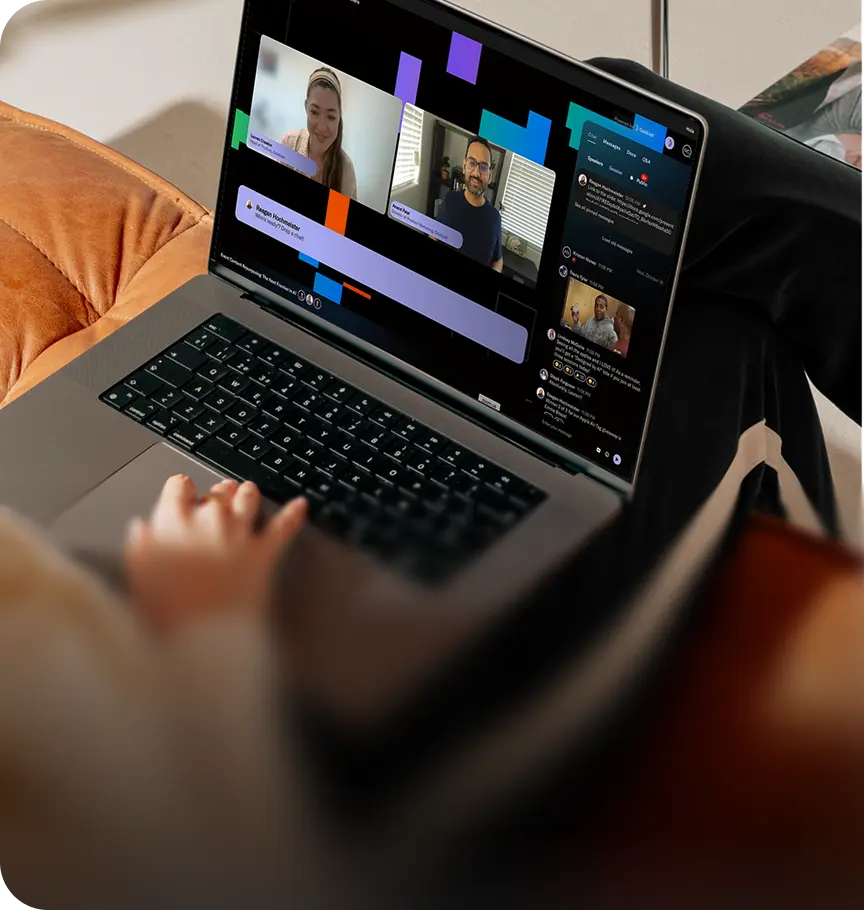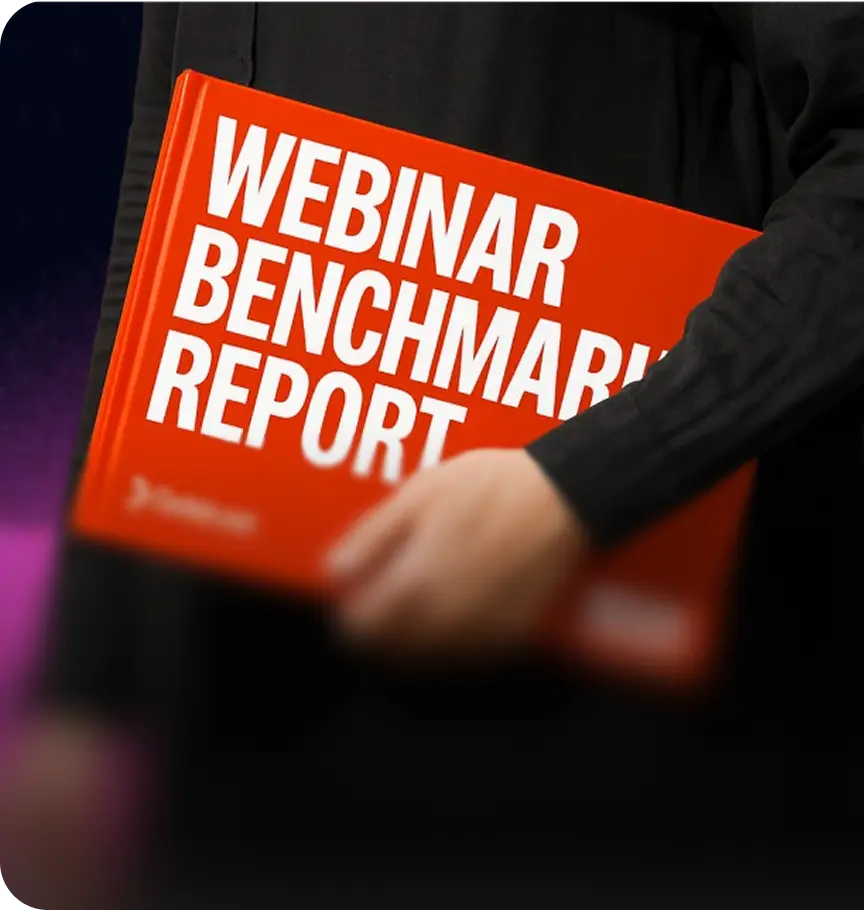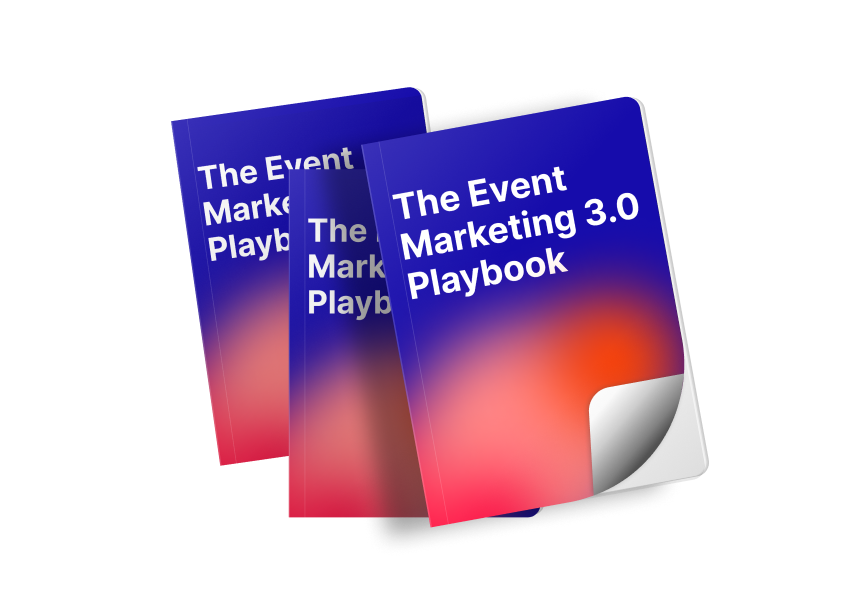The Event Marketing 3.0 Playbook
Today’s event and field marketers now have unprecedented access to the data they need to attribute real revenue to their events, and finally win a seat at the table.
Event marketing isn’t what it used to be. But even before the world was hit by a global health pandemic, B2B events were in the midst of a pivotal shift.
From merely showcasing your logo on the main stage to collecting stacks on stacks of business cards, those of us who frequented the events circuit prior to 2020 were already wondering if our time at events was actually time well spent.
But as human beings, it’s in our nature to meet and connect—and we knew events were helping us develop real relationships that would propel the business forward.
We just couldn’t prove it. But now we can. This eBook tells you how.
Read on to learn:
The Problem: B2B events are hard to measure The Shift: Field marketers as revenue levers The Solution: Link events to real revenue The Future: First the customer, then the data
The Problem: B2B events are hard to measure
Event Marketing 1.0: Hosting events to boost brand visibility and (hopefully) shake hands with the right people.
The age of the revenue marketer is officially here. But despite the growing body of evidence proving its potential as a profit center, many still view field and event marketing through the lens of event marketing à la the early 2010s.
At that time, B2B events were more about gracing the attendee list, showcasing your logo, and shaking hands with the right people.
Apart from having a good time, the goal of event marketing was brand visibility. But as the events space got more crowded, it became harder and harder to get seen.
"When I started in events in 2009, trade show floors we're the hub of the event, and getting a flash drive was the biggest swag win," says Adelle Rodriguez, Marketing Director, North America at RMS Cloud.
"As the years progressed, it took more and more to get attendee mindshare. Budgets grew, tactics got more elaborate—everything had to be bigger and better."
"I remember in 2015 one of the biggest drivers of business and brand awareness at an event was a party we threw offsite—an event within an event. We had a 3 story brownstone mansion that had a different party theme on each floor—and this was for a software industry event!"
"I think that events were getting out of hand and straying away from the main purpose—creating an environment for people to learn and network. Covid has been a harsh reset of the industry, and when we get back to in-person events, I think they will look very different."
The Shift: Field marketers as revenue levers
Event Marketing 2.0: Using events to generate demand and capture net new leads.
Fast forward a few years (and landing page platforms) later, event marketers have now taken B2B events a step further to generate and capture top of funnel leads. Today, events for demand generation have secured a foothold as a core tactic in every go-to-market playbook.
But if events were just about collecting email addresses, you could purchase leads like anyone else.
The real, unshakeable, underlying value of B2B events still lies in the human-to-human interactions that eventually lead to a signed deal.
Now that event marketing for lead generation has established itself as a viable pipeline lever, demand gen experts and field marketing pros are under pressure to accelerate those leads through the funnel.
"B2B events have become more people-focused than business-focused in today’s landscape," says Connor DeLaney, Community & Events Manager at IMPACT.
"In the past, we would focus on casting the widest net. Now, we focus on the individual connection and personal experience. More than ever, building trust through your events is the goal rather than getting as many people there as possible. In my opinion, this change has redefined what hosting a successful B2B event looks like."
How can field marketers align demand gen with ABM for more conversions?
First, field marketers need to build a common understanding of what field marketing actually is (and does). Then, they’ll have to align with sales to determine the right goals, KPIs and follow up tactics to transform events into revenue.
Glossary
Field marketers
Mini-CMOs who go beyond awareness-building to take ownership of the pipeline and arm the sales team with account-specific opportunities.
Account based marketing(ABM)
Identifying and prioritizing key accounts by monitoring their unique needs and engagement, then passing on these insights to personalize sales touch-points and close deals faster.
To be clear, field marketing isn’t ABM, but ABM is critical for its success. When field marketers can identify and prioritize key accounts by monitoring their unique needs and engagement with the brand, they can use these insights to make sure that every brand interaction—from direct mail and digital ads to account-specific ebooks and chatbots—actually moves prospects forward in the pipeline. "Now, there are so many tools that allow us to collect and act on so much more data," says Nicole Bansal, Director of Marketing, Americas & EMEA at Liftoff Mobile. "For each event we host, I can collect and share real-time registrant data across many platforms for my sales team and external vendors."
"We can use data like industry/vertical, account status, location, spend, etc. to segment and provide customized experiences for an e-commerce prospect that is different from a gaming customer. We can also use the data to track our event ROI on a much more granular level and inform our decisions on event strategy and budget for the next year."
"For example, we were able to see that our participation in a German conference/tradeshow was very successful in allowing us to close deals with prospects that were already in the pipeline but the new leads from our booth turned out to be largely unsuccessful. We made the decision to divest from our booth the next year and instead host a high-end dinner party for those prospects already in the pipeline. We saw the same level of success with a much lower investment in terms of dollars."
For B2B marketers using events at the top of the funnel, the following metrics are a great way to measure your success:
Event Level
- Number of qualified registrations
- Actual attendance numbers
- Average attendee time spent on event
- Most viewed sessions
- Least viewed sessions
- Time spent at event
- Overall time spent in breakout rooms
- Geographical data
- New press contacts
- Social press mentions
- Cost per contact/attendee
- Cost per lead/opportunity
New Pipeline
- Number of attendees
- Number of attendees from target accounts
- Ratio of net-new to existing contacts
- Net-new leads generated
- Demos/meetings held at or after event
- Net-new qualified leads (or MQLs)
- Pipeline generated from event
- Newly generated qualified opportunities
- Target accounts engaged
Account Level
- Average number of attendees by account
- Average time spent in the event
- Time spent in breakout rooms
- Sessions attended for each attendee
- Average time spent in each session
- Content/resources downloaded during each session
- Number of chat messages
- Poll answers
- Questions asked
"ABM is huge for field marketers because it’s all about personalization with direct mail, digital ads, using chatbots like Drift, etc," says Connor DeLaney Community & Events Manager at IMPACT.
"We need to crack our must win accounts and if you aren’t personalizing to their pain points today then you won’t succeed. People buy from people at the end of the day. Not just a person sitting behind some fancy tech."
The Solution: Link events to real revenue
Event Marketing 3.0: Every event is directly linked to revenue.
Like inbound, event marketing has finally become a core rev gen channel in its own right. In many ways, this is the change many field marketers have been calling for—but it comes with a whole new set of responsibilities.
With ROI and ROE firmly at the forefront, the days of ‘host and hope’ events are officially over.
Today, field marketing is positioned at the center of any smart marketing strategy. Because when field marketers can effectively leverage the power of ABM, they become an unstoppable force for any fast-track growth team.

But if you really want to take your events beyond hand shaking and Zoom fatigue to actually arming sales teams with account-level insights that help close deals, you’ll need to know exactly what to measure and how.
"Field marketing and demand gen teams have more pressure to prove their worth," says Kerrie Bond-Macinnes, Director of Global Events, Commercial at Medallia. "And they have to do it (in part) by using online events. I think more than anything, the past year has made event marketers rethink their strategies, and we've proved that virtual events can work if you know how to do them right."
"I was a live events professional for 10 years before COVID forced me to learn an entirely new skillset. I had no virtual event experience, not even webinars, and have spent more time thinking outside-the-box this year than I've had to in a long time. Moving forward, I think we're going to be required to keep up that mindset, even as in-person events come back."
"I think the days of renting out boxes at hockey games, slapping our logos on sponsor signage, and programming conferences with 10 hours of breakout sessions are mostly over. What I've learned most of all is people are really looking for connections and experiences. We have a huge opportunity now to really blow up everything we thought we knew about event marketing and make it exciting again."
Start by mapping an event strategy that starts with your attribution model and ends with a clear and defined follow up strategy:
What attribution model will you use to measure your event and why?
How do we attribute that deal if they meet us at a conference, then download a piece of content? Attend a dinner a month later, and then sign?
Do you use first-touch (conference)? Last-touch (dinner)? Or multi-touch attribution and assign 33% of the ROI across each touchpoint?
What are the KPIs that support your chosen model?Which tools will you use to measure those KPIs?
What are the core post-event actions for your team to take?
What are the core post-event actions for the sales team to take?
What is the goal for each?
What is the timeframe for each?
What’s the priority level of each?
Here are some of the metrics to think about:
Event ROI
- Number of qualified registrations*
- Account level insights (prospects)
- Account level insights (customers)
- Net new pipeline from the event
- Influenced pipeline from the event
- Velocity through pipeline
- Closed-won opportunities
- Closed-won revenue
- Cost per contact/attendee
- Cost per lead/opportunity
- Pipeline touched or generated from event
Account Level
- Average number of attendees by account
- Average time spent in the event
- Time spent in breakout rooms
- Sessions attended for each attendee
- Average time spent in each session
- Content/resources downloaded during each session
- Number of chat messages
- Poll answers
- Questions asked
New Pipeline
- Net-new leads generated
- Demos/meetings held at or after event
- Net-new qualified leads (or MQLs)
- Pipeline generated from event
- Newly generated qualified opportunities
- Target accounts engaged
Existing Pipeline
- New leads from customer accounts
- Renewal rate improvements
- Number of prospects without an open opportunity
- Number of prospects with an open opportunity
- Number of existing customer with expansion opportunities
- Funnel velocity/acceleration
- Win rate improvements
- Expansion/opportunities generated
- Referral customers gained
- NPS of those that attended vs. those that didn’t
"We've moved to measurable event ROI and ROE vs. hosting events that we believe our guests want," says Mahogany Jones Founder of The Vendry. "We've started focusing more on the experience and the customer journey to effectively our events as a marketing and relationship building tool. We have affordable technology now that allows us to create immersive and trackable experiences."
Examples of steps to take to link events to revenue
Event: Predictability 2021 Summit
Audience: CISOs at enterprise companies
- Divide attendee list into three categories: ‘attendees’, ‘demo attendees’ and ‘no shows’.
- Send ‘Demo attendees’ short thank you email with on-demand recording of event sessions.
- Send ‘Attendees’ same email but with Gartner’s Cool Vendor Report, a note about Axonious recently making the list, and info on how to set up a demo.
- Send ‘No shows’ event recording, piece of content and CTA to reach out with any questions.
- Marketing hands sales recap spreadsheet with sessions attended by each attendee, and resources downloaded.
- Sales sends ‘demo attendees’ and ‘attendees’ customized emails using separate templates for each.
- Sales customized first touches and 1:1s for top accounts and active prospects.
The Future: First the customer, then the data
Event Marketing Future: Proving revenue and accelerating the pipeline with experience-driven events your prospects and customers love.
Most prospects have several different touchpoints with your company before they sign, and while it’s important to understand how events and other marketing touchpoints contribute to closed business deals (and equally as crucial to build the attribution models you need to back that up), the future of event marketing isn’t only about data.
"The next generation of event marketing is going to become more focused, more tactical, and less about scale. No longer will we hear 'Join 10,000 people just like you!' Instead, as with all users in the digital age we live in, we will hear calls for an experience that feels exclusive, personalized, and 'me' focused," says Connor DeLaney, Community & Events Manager at IMPACT.
Event marketers will be challenged to create new experiences that feel personalized, value-driven and unforgettable—all at once.
More than ever, you’ll be charged to seamlessly integrate in-person experiences with virtual experiences in a way that leaves a lasting impression with the right people. The good news is, there are now more tools than ever to help you nail it.
"B2B Events today might as well be the 3rd cousin twice removed from events 10 years ago," says Adelle Rodriguez, Marketing Director, North America at RMS Cloud.
Look for ways to recreate the magic of an in-person event. Aim to create a more hands-on experience that goes beyond simply telling someone how to do something, to helping them experience doing it alongside an expert speaker or facilitator.
Workshops, bootcamps, VIP and virtual peer group experiences will all play a role in the future of event marketing and while large-scale keynotes will always be in high demand, don’t be afraid to introduce smaller, more exclusive experiences that help you foster a genuine connection with your top prospects.
"With the recent events in mind, I believe the industry won't go back to the old standard but there will be a mix of all the types of events that emerged and gained popularity," says Karolina Mikova Global Event Specialist at MANTA.
"In-person events are crucial for building relationships and will return, but I hope the conferences will focus more on socialization and bringing people together. I think the concept of webinars and online events will remain as people got used to having content available at home to be streamed later if needed."
Because even though we’ve been doing more business virtually than ever before, doesn’t mean we can’t keep the connection that made events effective in the first place. In the words of Sruthi Kumar, Associate Director of Field & Partner Marketing at Sendoso, “Field marketers are in a unique position to create programs to reach both prospects AND customers in a customer journey — from creating programs that are more top of funnel like
thought leadership webinars to hosting intimate happy hours that are deal accelerators or retention programs.” For revenue-focused field marketers, the opportunities to make a real impact for both prospects, customers and the organization at large, are truly endless.
Ready to deliver a truly unforgettable virtual event experience?
Discover why Goldcast is the B2B digital events platform of choice for brands like Adobe, Microsoft, Zuora, and Mailchimp.
Stay In Touch
Platform
Resources
© 2026 Copyright Goldcast, Inc. All rights reserved.





 Upcoming Events
Upcoming Events Event Series
Event Series On-Demand Events
On-Demand Events


